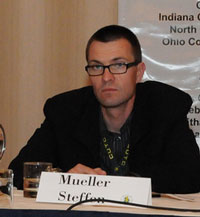A fifth E85 station for Long Island has opened this month, making it the 64th outlet for flex fuel vehicle (FFV) drivers in New York to fill up with 85 percent ethanol.
 Bridgehampton Service Station opened the new E85 pump on Montauk Highway in Bridgehampton. “One of the main reasons we decided to install E85 was because we have hundreds of FFV’s in our surrounding cities that can fuel up. We built a station that offers E85 because we recognize the local demand to do things ‘green’,” said station owner Albert McCoy. “An added incentive is that there was funding available to assist with infrastructure.” Since the installation of the E85 pump this summer, Bridgehampton has been pumping 300-400 gallons of E85 fuel daily.
Bridgehampton Service Station opened the new E85 pump on Montauk Highway in Bridgehampton. “One of the main reasons we decided to install E85 was because we have hundreds of FFV’s in our surrounding cities that can fuel up. We built a station that offers E85 because we recognize the local demand to do things ‘green’,” said station owner Albert McCoy. “An added incentive is that there was funding available to assist with infrastructure.” Since the installation of the E85 pump this summer, Bridgehampton has been pumping 300-400 gallons of E85 fuel daily.
The station was installed with help from Growth Energy’s 2010 E85 and Blender Pump funding program. “We are pleased to partner with Bridgehampton Service Station to provide greater access to high level blends of ethanol for New York drivers,” said Growth Energy CEO Tom Buis. “Increased consumption of ethanol will reduce our dependence on foreign oil, clean our air and help create jobs in Bridgehampton and across the country.”


 Recent studies show the significant efficiencies spurred by growth and development in the ethanol industry, according to the
Recent studies show the significant efficiencies spurred by growth and development in the ethanol industry, according to the  “With corn ethanol you also produce an animal feed product simultaneously, to which you have to assign a co-product credit, meaning you subtract the emissions to produce that feed product from the life cycle of corn ethanol,” Steffen explained in an interview. “Now, we’re also looking at other co-products. For example, a lactate which is a solvent that can substitute for petroleum-based solvents in the marketplace.”
“With corn ethanol you also produce an animal feed product simultaneously, to which you have to assign a co-product credit, meaning you subtract the emissions to produce that feed product from the life cycle of corn ethanol,” Steffen explained in an interview. “Now, we’re also looking at other co-products. For example, a lactate which is a solvent that can substitute for petroleum-based solvents in the marketplace.” Steffen Mueller Interview
Steffen Mueller Interview







